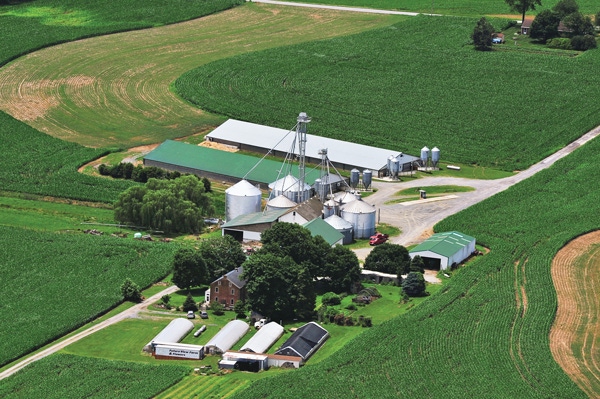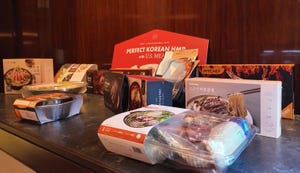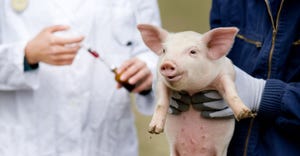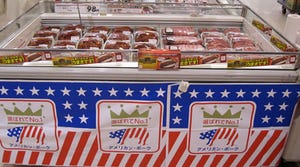Focused on the Future: Jeff and Sue Frey are 2012 Pork Industry Environmental Stewards
Jeff and Sue Frey are always thinking about tomorrow on their Future View Farm. But the Frey family starts each day, quite literally, in the shadow of history. Nestled in Pennsylvania’s historic Lancaster County, the Frey family can trace the roots of their farm all the way back to William Penn.
September 15, 2012

Jeff and Sue Frey are always thinking about tomorrow on their Future View Farm. But the Frey family starts each day, quite literally, in the shadow of history.
Nestled in Pennsylvania’s historic Lancaster County, the Frey family can trace the roots of their farm all the way back to William Penn. He provided the original deed to the land in 1710, decades before the founding of the nation — in fact, decades before George Washington was born. The land became known as Boehm’s Homestead, one of the first farms in Lancaster County.
In 1791, that pioneer family built a house of worship called Boehm’s Chapel. It stands guard today on a hill above Future View Farm, overlooking the Frey’s diversified operation. The chapel has been designated a state historic site and receives many visitors. But the Frey family has a unique perspective. “We’re the only people who have a view of the Boehm’s Chapel’s front door,” Jeff points out. “The chapel is a constant reminder that our Lord and Creator is watching over us!”
Many neighbors
Future View Farm is located just six miles south of the city of Lancaster in an area where population is growing rapidly. In addition to the visitors to the church on the north side of the farm, there’s a busy four-lane highway on the east, a paved township road on the west, and a former rail line on the south, now a hiking trail.
“This farm has no hidden corners,” Sue points out. “This public exposure is a great motivator to keep the farmstead in tip-top shape. We take pride in knowing that our farm can be viewed by the public from any angle and direction.”
In fact, one of the diverse enterprises on this farm encourages customers to visit. “We grow corn, soybeans, wheat and barley on about 675 owned and rented acres,” Jeff says. “In addition to finishing pigs, we do custom farming, and Sue grows and sells Easter flowers, such as tulips, hyacinths and daffodils.”
The swine operation consists of two finishers — a 2,000-head, tunnel-ventilated barn built in 1997, and a 2,180-head barn built in 2007. The barns are under contract with Country View Family Farms.
A driveway that connects to the township road serves the pork production site, while customers for the retail flower business use a driveway leading from the four-lane highway. The farmhouse and greenhouses are separated from the swine facility by an old bank barn and the grain-storage setup. Separate driveways allow an extra degree of biosecurity, keeping the public at a distance from the pigs.
It also allows the Frey family an opportunity to educate the public about modern pork production. “When we get to talking with Sue’s customers and mention that we raise hogs, many of them are surprised,” Jeff says. “They have no idea that they are so close to a pork production facility. It’s a chance to talk about how we raise hogs, and to inform them about our efforts to improve the land through practices such as no-till. They ask me if I have started my spring plowing, and I point out that we no longer use a plow on this farm.”
Family farm
Future View Farm is truly a family business. The Freys’ son, 15-year-old Ross, and his 9-year-old sister, Clara, each have responsibilities in the operation. Jeff’s nephew, Jeremy Railing, plays a key role in the daily management of the farm.
While the farm has been home to Jeff’s family for generations, it was only in 1987 that Jeff and his parents had the opportunity to purchase the Boehm’s Homestead site. Jeff and Sue moved into the “new” house (built in 1893) when they were married in 1993.
Sue put her degree in floriculture to work, adding the greenhouses and coolers to grow and sell Easter flowers. Low profit margins in the grain business led to the family’s decision to finish pigs, beginning with the first building in 1997.
The pork production site receives an annual inspection from the state’s Department of Environmental Protection, when officials review manure- hauling records and look for any environmental concerns. “We had a voluntary nutrient management plan when we built the first barn,” Jeff recalls. “The transition to a mandatory plan when we built the second barn just seemed like a natural part of the expansion.”
Cover crops
Future View Farm lies within the Chesapeake Bay watershed, which continues to be closely watched and highly regulated due to excess nutrients reaching the bay. The Freys protect that watershed by managing manure carefully.
They store manure in deep pits under the buildings and apply the manure mostly in the spring, surface spreading on actively growing cover crops.
“We only apply manure with tractors that are equipped with duals or high-flotation tires and, we use tri-axle spreaders with flotation tires to minimize compaction,” Jeff explains. “We don’t use any mechanical devices to disturb the soil in order to inject manure. Soil that has had manure mechanically injected is more subject to soil loss on our rolling topography.
“The cover crops are our ‘injectors,’ a million little plants out there per acre that capture the manure,” he continues. “The cover crop acts like a sponge, soaking up the nutrients.”
Wheat is Future View Farm’s cover crop of choice, sometimes with another species, such as oilseed radish added to the seeding mix. The cover crop is chemically killed ahead of corn planting, and the nutrients are released to the growing corn crop as the cover crop breaks down.
“Using swine manure cuts our fertilizer bill and the crops just love it,” Jeff says. “The manure also provides organic matter and micronutrients. The slow release of nutrients matches up well with the needs of the corn crop. It does wonders for the crop.”
All commercial manure applicators in Pennsylvania must be certified. A veteran custom applicator, Jeff has taken an active role in certification requirements. As a member of the Penn Ag Manure Haulers Council, he helped shape some of the legislation formulated by the state. The Frey family also hosted a certification field day for the voluntary manure hauler certification program.
“The model used at our farm in the voluntary system helped lead to state adoption of the certification program,” Jeff points out.
Conservation approach
Another way that Future View Farm protects the Chesapeake Bay watershed is with a long-term commitment to no-till farming practices. “We have used no-till for 27 years,” Jeff says. “We have seen an improved soil structure, and water infiltrates better, so we have less runoff. No-till and swine manure are a great combination to build soil health.”
Jeff is a founding member of the Pennsylvania No-till Alliance, a statewide organization. This farmer-to-farmer program is designed to promote the no-till concept and assist growers who are looking to improve their no-till methods.
The Frey family has installed terraces and waterways on the home farm and some of the rented land. They also have enrolled in the Natural Resources Conservation Service’s Conservation Stewardship Program (CSP), and have increased stream and waterway buffers.
The farm also has taken a unique approach to water conservation in the hog barns. When the second hog building was constructed, instead of constructing a storm water catch basin, they installed an in-ground, 20,000-gallon cistern to catch rainwater from the roof.
“The cistern helps complement a low-yielding well on the farm,” Jeff says. “The well fills the cistern, but is turned off during periods of heavy rainfall.” A float installed in the cistern allows workers to check the water level daily. A fire hydrant was also installed in the cistern, which provides quick access to a water source, should the need arise.
To boost air quality, Frey removed the barns’ pit fans and initiated a routine of purging the air by running the end-wall fans for one to three minutes out of a five-minute cycle. That approach has been in place for about five years, and the family reports it has improved air quality inside the barns, reduced odor emissions and lowered their electric bill.
The farm also constructed an on-site mortality composter to eliminate the need for visits from rendering trucks. They constructed bays between the two barns by arranging large, precast concrete blocks. Loose straw and spent flowers serve as the composter’s carbon sources.
Peaceful pond
A railway, abandoned in 1973, defines the southern boundary of the farm. The track has been removed; the Frey family maintains the old rail bed as its personal rail-to-trail project. “We can take a hike around the farm while enjoying this tree-lined, scenic natural area,” Sue says. Deer, many bird species and assorted animals are frequently seen in this natural habitat.
A pond on the southeast corner of the property, next to the hiking trail, harbors a thriving fish population as well as great blue heron.
An increased stream buffer created as a part of the farm’s CSP efforts also provides a big boost to wildlife. It all adds up to a tranquil spot that the family frequently uses for rest and relaxation.
It’s all a part of the Frey family goal of creating a family farm that can continue to operate well into the future. The family preserved the farm with a state conservation easement in 1991. Lancaster County leads Pennsylvania in farmland protection, having preserved nearly 100,000 acres in perpetuity for agricultural production.
“This gives us peace of mind that our land will always be used for its highest and best use — agriculture,” Jeff says. “Preservation efforts assure that viable agricultural production is here to stay, even in the heavily populated Northeast.”
Learn more about the operation by looking through the photo gallery posted on the National Hog Farmer Web site. Take a video tour of the Frey's award-winning operation here.
You May Also Like



